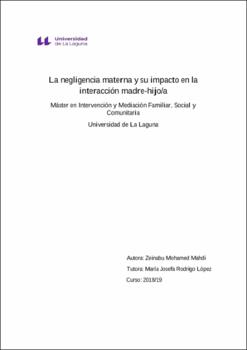La negligencia materna y su impacto en la interacción madre-hijo/a
Autor
Mohamed Mahdi, ZeinabuFecha
2019Resumen
La negligencia es el tipo de maltrato infantil que más se da en nuestra sociedad.
Se caracteriza principalmente por la incapacidad por parte de los cuidadores para cubrir
las necesidades básicas de los menores. Este tipo de maltrato acarrea numerosas
consecuencias perjudiciales para el desarrollo integral de los menores. En esta línea, la
presente investigación está orientada a conocer la calidad de la interacción de las
madres negligentes con sus hijos/as, y la posible influencia del maltrato vivido y los
eventos vitales negativos experimentados durante la vida en dicha interacción. Se utilizó
una muestra integrada por 41 madres controles y 39 madres negligentes de diferentes
municipios de la isla de Tenerife y Gran Canaria. Los datos fueron recogidos mediante
cuatro instrumentos: cuestionario de perfil sociodemográfico, cuestionario de maltrato,
cuestionario sobre eventos vitales negativos y una escala observacional de accesibilidad
emocional. Los principales resultados y conclusiones muestran que las madres con
comportamientos negligentes manifiestan una peor calidad de interacción con sus
hijos/as en la escala de accesibilidad emocional. Además, las madres con
comportamientos negligentes han sufrido maltrato en su historia personal en mayor
grado que las controles. Por último, los resultados señalan que las experiencias de
maltrato, concretamente el abuso emocional y maltrato físico influyen en la variable
hostilidad en la calidad de interacción madre-hijo/a. Neglect is the type of child abuse that occurs most in our society. It is mainly
characterized by the inability of caregivers to cover the basic needs of minors. This type
of abuse leads to numerous harmful consequences for the integral development of
minors. In this line, the present investigation is oriented to know the quality of the
interaction of the negligent mothers with their children and the possible influence of the
lived abuse and the negative vital events experienced during the life in said interaction.
The sample was composed of 41 control mothers and 39 negligent mothers from
different municipalities of the island of Tenerife and Gran Canaria. The data were
collected through four instruments: sociodemographic profile questionnaire, abuse
questionnaire, questionnaire of negative vital events and an observational scale of
emotional accessibility. The main results and conclusions show that mothers with
negligent behaviors show a worse quality of interaction with their children on the
emotional accessibility scale. In addition, mothers with negligent behavior have
suffered abuse in their personal history to a greater degree than controls. Finally, the
results indicate that experiences of abuse, specifically emotional abuse and physical
abuse influence the hostility variable in the quality of mother-child interaction.





